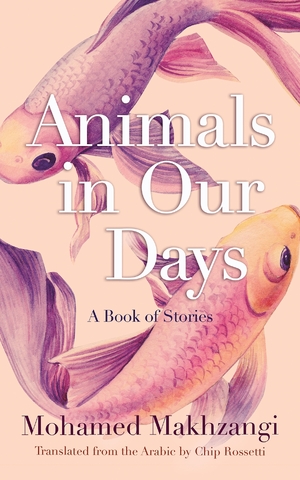"A powerful and innovative collection of stories by an important, wonderful Egyptian writer.... The stories are intricate political commentaries on Egypt’s recent history but they also range across the post-colonized world; the history of violent imperial conquest and encounter is prominent. Myriad kinds of domination and greed are beautifully sketched, with a deep sympathy as well."—Marilyn Booth, translator of Celestial Bodies, winner of the 2019 Man Booker International Prize
"In this book, Mohamed Makhzangi—one of our most important contemporary short story writers—makes us realize the consequences of our actions: how we have come to burden animals with despair, madness, and rage, and how we can restore the hidden bonds between us and the animals in our days."—Ahmed Naji, author of Using Life
Description
Each story in Mohamed Makhzangi’s unique collection Animals in Our Days features a different animal species and its fraught relationship with humans—water buffalo in a rural village gone mad from electric lights, brass grasshoppers purchased in a crowded Bangkok market, or ghostly rabbits that haunt the site of a long-ago brutal military crackdown. Other stories tell of bear-trainers in India and of the American invasion of Iraq as experienced by a foal, deer, and puppies.
Originally published in 2006, Makhzangi’s stories are part of a long tradition of writings on animals in Arabic literature. In this collection, animals offer a mute testament to the brutality and callousness of humanity, particularly when modernity sunders humans from the natural environment. Makhzangi is one of Egypt’s most perceptive and nuanced authors, merging a writer’s empathy with a scientist’s curiosity about the world.
Like Barbara Kingsolver’s Flight Behavior, Haruki Murakami’s The Elephant Vanishes, or J. M. Coetzee’s Lives of Animals, Makhzangi’s stories trace the numinous, almost supernatural, connections between our species and others. In these resonant, haunting tales, Animals in Our Days foregrounds our urgent need to reacquire the sense of awe, humility, and respect that once characterized our relationship with animals.
About the Author
Mohamed Makhzangi was born in Egypt and lives in Cairo. He practiced as a doctor for twelve years before turning to journalism and science writing, working in Kuwait on al-Arabi magazine. He has published several volumes of short stories, and translations of his work have appeared in five languages. In 1992, he won Egypt's Best Short Story Collection Award.
Chip Rossetti is the editorial director of the Library of Arabic Literature at New York University Press. His translations include Ahmed Khaled Towfik’s Utopia and Sonallah Ibrahim’s Beirut, Beirut.
June 2022


